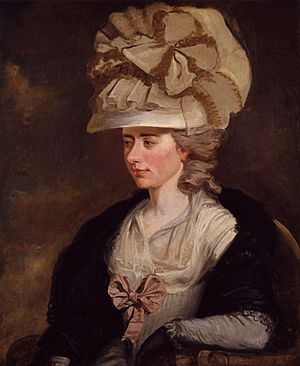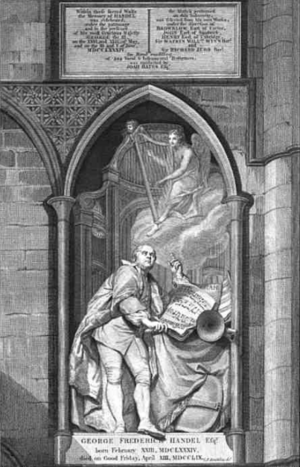Edward Francis Burney facts for kids

Edward Francis Burney (1760–1848) was a skilled English artist. His middle name is sometimes spelled "Francisco" or "Francesco." He was known for his beautiful paintings and for drawing pictures for many books.
Contents
His Life as an Artist
Edward Francis Burney was born in Worcester, England, on September 7, 1760. His parents were Richard Burney and Elizabeth Humphries. He came from a very artistic family! His uncle, Charles Burney, was a famous music expert. His cousin, Frances (or "Fanny") Burney, was a well-known writer.
Edward started studying art at the Royal Academy Schools in 1776. A famous painter named Sir Joshua Reynolds encouraged him a lot. This helped him become a great artist.
Exhibiting His Art
Edward showed his artwork at the Royal Academy from 1780 to 1803. He painted many different things. These included historical scenes and pictures of his friends and family.
He drew a portrait of his cousin Frances. This picture was later printed in her books. In 1780, he showed three drawings that brought her novel Evelina to life. These drawings were later used in a 1791 edition of the book.
Edward did a lot of work illustrating books. He created a series of drawings for an edition of John Milton's famous poem, Paradise Lost. His detailed illustrations helped readers imagine the stories.
Clever Satirical Art
In the 1820s, Burney created four large watercolour paintings. These were not just pretty pictures. They were "satirical," meaning they made fun of or commented on music and social life at the time.
Some of these paintings include The Waltz and The Elegant Establishment for Young Ladies. These are now kept at the Victoria and Albert Museum. Other works are Amateurs of Tye-Wig Music and The Glee Club; or, The Triumph of Music. These are at the Yale Center for British Art.

Music Debates in Art
Edward even turned Amateurs of Tye-Wig Music into a large oil painting. This painting is now at the Tate Gallery. It shows a funny scene about a big debate back then. People argued about whether new music (like Beethoven and Mozart) was better than older music (like Handel and Corelli).
In the painting, a bust (a sculpture of a head and shoulders) of Handel watches over a group of musicians. They look a bit messy and are playing an old piece by Corelli. Edward's uncle, Charles Burney, was actually part of this debate. He thought the newer music was better! Edward's painting cleverly showed this disagreement.
His Later Years
Edward Francis Burney passed away in London on December 16, 1848. He was 88 years old. He never married.
 | Laphonza Butler |
 | Daisy Bates |
 | Elizabeth Piper Ensley |

